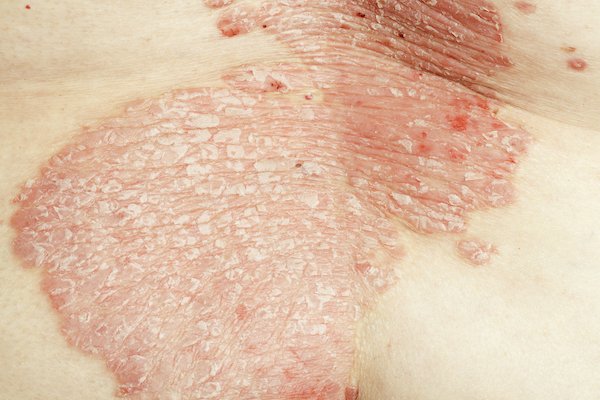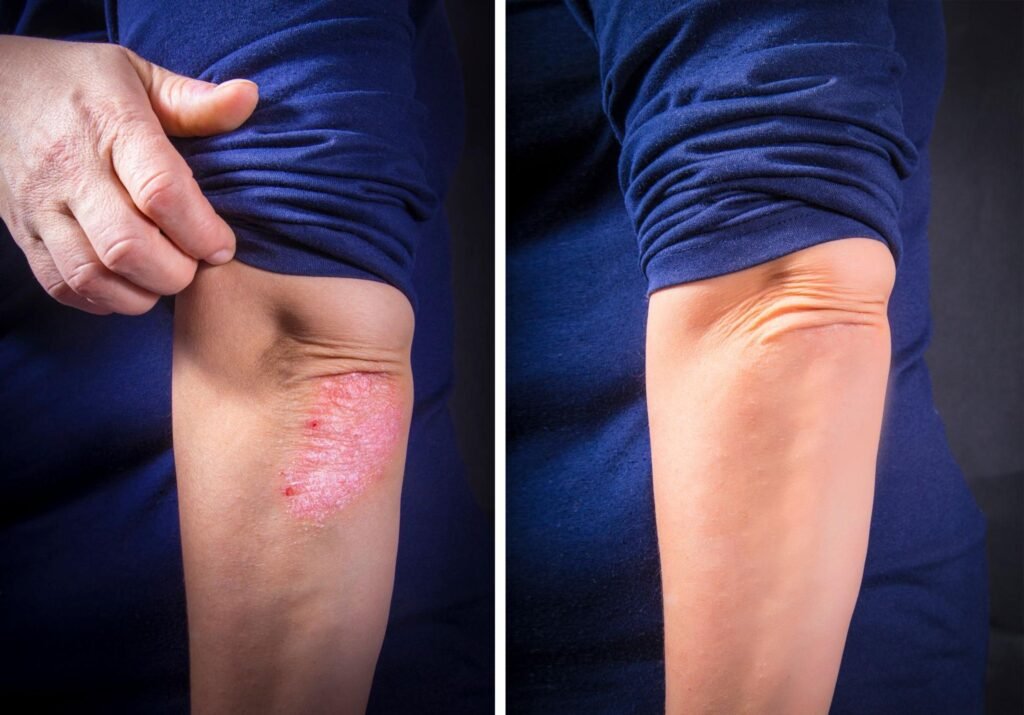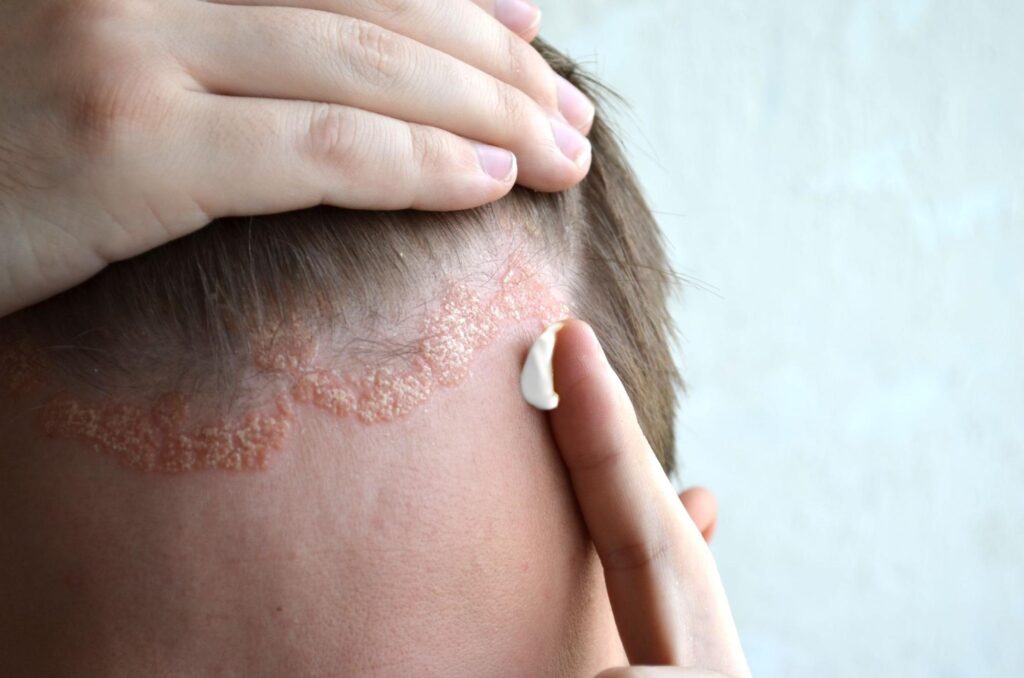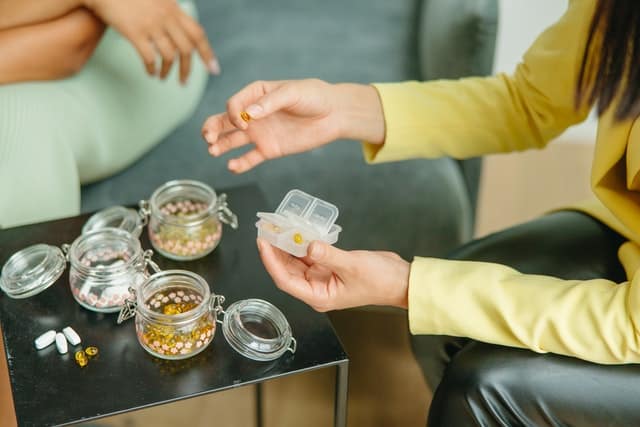Have a question?
New York Locations
Book Now
Have a question?
Book an appointment
4 New York Locations
Menu
Have a question?
New York Locations
Psoriasis is a very common, chronic and cyclic skin condition that affects over 7.5 million adults in the United States and involves flare-ups that can occur from weeks to several months, followed by periods of remission. Unfortunately, there is no cure, but treatments do provide relief from symptoms.
Although symptoms may vary for each patient, the most common symptoms of psoriasis are:
The most characteristic symptom of psoriasis is the presence of red patches. These can come in the form of a few areas of dandruff-like scaling to major eruptions spread in large areas. They are very often found on the scalp, face, palms, lower back, legs, elbows, knees, and soles of the feet.
Patients can have variable symptoms because this disease comes in different forms that affect the skin and body in different ways.

This represents the most common type of psoriasis. It is characterized by raised, dry, red skin patches that are spread over by silvery scales. The patches can be either itchy or tender, few in number or many. As stated above, they can usually be found on the scalp, elbows, knees and lower back.
This form of psoriasis impacts toenails and fingernails. Psoriatic nails can be pitted, grow in an unusual way or be discolored. They can also get loose and detach from the nail bed. In severe cases, nails can even break apart.
This sort of psoriasis is mostly found in children and young adults. Patients develop drop-shaped, scaling lesions on the arms, chest, or legs. A bacterial infection is usually the cause.
This type of psoriasis results in smooth, red-skin patches that deteriorate with sweating and friction. It is thought to be triggered by fungal infections. It mostly affects the skin folds of the groin, buttocks and breasts.
If you are experiencing any of the symptoms described above or if you think you may possibly have psoriasis, the first thing to do is to see a good family doctor.Don’t wait any longer and schedule an appointment with Doctor Roya today. As one of the top doctors in New York, she is fully trained in every aspect of traditional medicine and will know exactly what to do to keep you healthy and happy.
Doctor Roya is able to help you with any health issue you may have. Doctor Roya J. Hassad accepts most major insurances and has four convenient locations in New York.

Depending on what’s better for you, you can make an appointment in one of her offices in Long Island, Queens or Manhattan.
To diagnose that type of disease, the doctor will ask a series of questions in relation to your health and will examine your body, especially your skin, scalp and nails. Usually, they will also do a biopsy by taking a small skin sample and examining it under a microscope. This will allow the doctor to identify the form of psoriasis you may suffer from and exclude other disorders.
There are a lot of different types of treatments available to treat psoriasis. The doctor will choose a treatment depending on the severity of the psoriasis. The patient may have to try several treatments or combinations of treatments before finding the one that works the best for them. Before treatment, patients will usually suffer from large patches of red skin or other psoriatic eruptions on the body. After a successful treatment, the psoriasis will be either entirely cleared away or almost and all psoriatic symptoms will have disappeared, as you can see in the before/after picture below.


The most widely used treatment for mild to moderate that disease is corticosteroids. They come in the form of lotions, ointments, gels, creams, foams, shampoos, and sprays. During flare-ups, they are usually applied once a day, and on alternate days to maintain remission. If used over too long of a period or if overused, corticosteroids can make the skin become thin. Over a long period of time, they may lose their effectiveness.
Light therapy is highly recommended for moderate to severe psoriasis. It can be administered either alone or in combination with other treatments. In this treatment, the skin is exposed to controlled amounts of light.. If you’re suffering from psoriasis, schedule an appointment with Doctor Roya today to find out if light therapy is a good option for you.

In the case of moderate to severe psoriasis and if all other treatments have failed, the doctor may consider prescribing oral or injected drugs. These drugs can have severe side effects, so they should only be used for short periods and the doctor may wish to alternate them with other treatments.

Many patients claim that alternative therapies have been able to relieve the symptoms of psoriasis. However, the effectiveness of these therapies has not been proven by the scientific community. Alternative therapies consist in special diets, creams, dietary supplements, and herbs. The good thing about these therapies is that they are usually safe and without side effects. If successful, they can reduce itching and scaling in cases of mild to moderate psoriasis. They can also help to avoid psoriasis triggers, such as stress.
If you have further questions about psoriasis, Doctor Roya is ready to answer them. A world-acclaimed NY medical professional, she is committed to transforming the lives of others through effective, personalized healthcare. Get your life and career back on track with her help.
Yes, indeed. Research has shown that psoriasis tends to run in families. During your consultation in the New York area (Long Island, Queens, Manhattan), Doctor Roya will ask you about the presence of psoriasis in your family’s medical history in order to confirm the diagnosis.
While doctors classify psoriasis as a skin condition, it is true that psoriasis can affect more than just your skin. Psoriasis can cause patients to have a low self-esteem. Furthermore, psoriasis can make mobility more difficult for patients, especially when it occurs on the hands or feet. Patients will also need medical assistance, such as the help of Doctor Roya overcome the disease.
12 Bond St, Unit C2 Great Neck NY 11021
895 Park Ave, Suite 1 B, New York, NY 10075
41-02 75th Street First floor Elmhurst, NY 11373
109 East 36Th Street, NY 10016